
Chronic Lymphocytic Leukemia/Small Lymphocytic Lymphoma
Latest News

Latest Videos

CME Content
More News

Venetoclax demonstrated impressive efficacy in octogenarians with CLL, although treatment management posed some challenges.

Real-world data show no significant differences in overall survival between patients with or without cytogenetic risk factors.
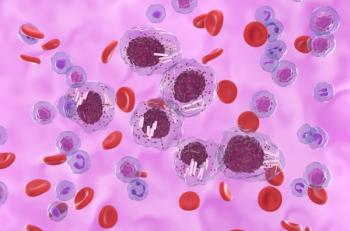
With a 42% reduction seen in the use of hematopoietic stem cell transplantation (HSCT) throughout the decade, researchers suggest that transplantation may be reserved for more fit patients.
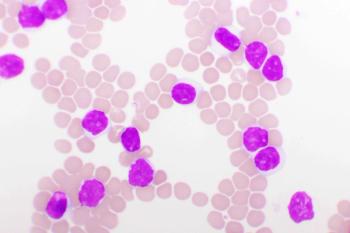
Zanubrutinib showed long-term efficacy in patients with chronic lymphocytic leukemia (CLL) or small lymphocytic lymphoma (SLL) and deletion of the 17p chromosome, with progression-free survival similar to patients without high-risk disease characteristics.

Switching patients with chronic lymphocytic leukemia (CLL) from ibrutinib to zanubrutinib has led to fewer cardiac adverse effects and a reduced workload for Mohit Narang, MD, managing partner at Maryland Oncology Hematology.

People with chronic lymphocytic leukemia (CLL) saw a 55% year-to-year increase in all-cause mortality in the early days of the pandemic, a Swedish study found.

The real-world data showed lower rates of atrial fibrillation and hypertension associated with the second-generation Bruton tyrosine kinase inhibitor among patients with chronic lymphocytic leukemia (CLL).

A significant number of patients taking Bruton tyrosine kinase inhibitors (BTKis) for chronic lymphocytic leukemia (CLL) develop atrial fibrillation (AF).

Mohit Narang, MD, explains why he switches patients with chronic lymphocytic leukemia (CLL) to the second-generation Bruton tyrosine kinase inhibitor.

Participants in the CLL11 trial and a smaller group of patients followed after study completion showed improved overall survival with obinutuzumab and chlorambucil (G-Clb) compared with chemotherapy plus rituximab or chemotherapy alone for chronic lymphocytic leukemia (CLL).
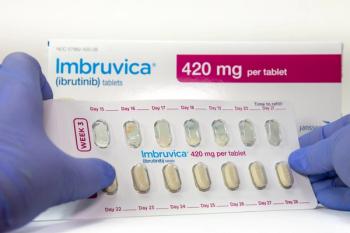
The findings come from a review of 4 randomized clinical trials, which found that statin use at the start of treatment was associated with improved cancer-related survival, overall survival, and progression-free survival.

Minimal residual disease (MRD)-guided triple therapy showed promising results for relapsed chronic lymphocytic leukemia (CLL), achieving high rates of undetectable disease and prolonged survival.
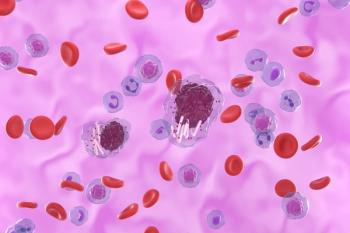
Acalabrutnib plus venetoclax, with or without obinutuzumab, improved progression-free survival (PFS) compared with chemoimmunotherapy (CIT) in patients with untreated chronic lymphocytic leukemia (CLL), meeting the phase 3 AMPLIFY study’s primary endpoint.

Pierluigi Porcu, MD, speaks to the considerations clinicians need to account for to balance cost, patient experience, and outcomes for those with chronic lymphocytic leukemia (CLL).

Previous work had suggested pausing Bruton tyrosine kinase (BTK) inhibitors before COVID-19 vaccination might boost immunity in patients with chronic lymphocytic leukemia (CLL).

Progression-free survival improvement and drug costs make zanubrutinib a more cost-effective option in relapsed or refractory chronic lymphocytic leukemia (CLL), new research suggests.

Patients with chronic lymphocytic leukemia (CLL) who experience Richter transformation have a poor prognosis, but ibrutinib may help boost the efficacy of chimeric antigen receptor T-cell therapies.

A number of recent trials have explored potential strategies for using immunotherapy in chronic lymphocytic leukemia (CLL).

New findings may help patients with low to moderate risk of tumor lysis syndrome while reducing the burden for hematologists.

A study of 200 patients with chronic lymphocytic leukemia (CLL) showed a lower rate of severe and serious adverse events among those treated with zanubrutinib compared with ibrutinib.
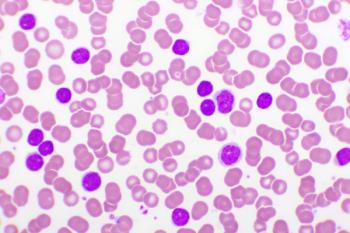
Researchers also highlighted the significance of TTNT-D as a real-world measure of treatment efficacy, noting it provides insight into both clinical and patient-centered outcomes.

Investigators found that lipid metabolism disruptions spark T-cell dysfunction in patients with chronic lymphocytic leukemia.

Treatment with liso-cel induced long-term complete remission rates and high undetectable minimal residual disease rates in patients with chronic lymphocytic leukemia (CLL)/small lymphocytic lymphoma following progression on Bruton tyrosine kinase inhibition and venetoclax.

Ibrutinib remains a key treatment for relapsed chronic lymphocytic leukemia (CLL), but findings suggest that combining it with other therapies can improve response rates and may allow for treatment discontinuation in some patients.

Patients treated in community settings were more likely to be older, less likely to be White, and had worse survival rates, highlighting disparities in specialized cancer care.











